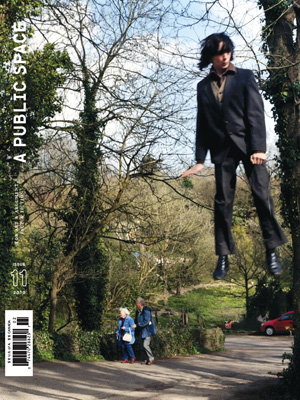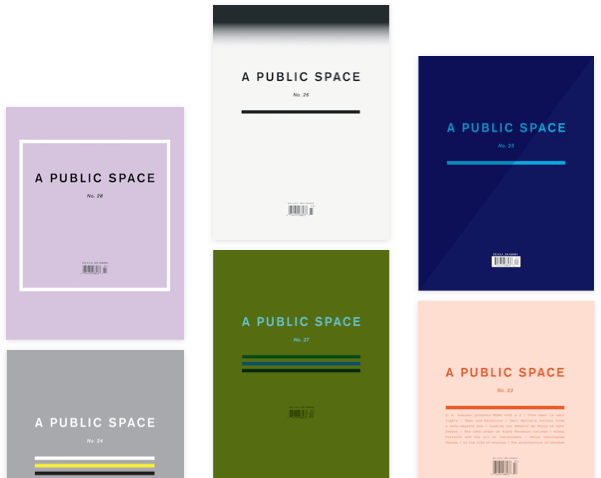Magazine
A Public Space
No. 11
Mercè Rodoreda at Carnival; Francis Spufford on the Soviets and the story of an idea; Stephen Burt on new American poets; Julian Gough explains how to fall in love properly; Geoffrey G. O'Brien catalogs three years; Annie Coggan makes a home for Ulysses Grant, and Rachel Cohen takes a tour; Allan Gurganus's Lair and Refuge; Ian Chillag, Maud Casey, Brian T. Edwards, and Aviya Kushner on laughter; and reintroducing Charles Newman.

Table of Contents
If You See Something
Falling and Laughing
Comic writers laugh at the folly of humanity (“Poor, sufferin’ Hugh Mannity,” as Flann O’Brien put it).
If You See Something
Wanting to Be a Fact
In Max Frisch’s strange and beautiful little novel Man in the Holocene, an old man named Geiser is trapped in his home in an Alpine valley in southern Switzerland by the collapse of a supporting wall that blocks the highway to the tiny village.
If You See Something
I’m Not Crazy About That Part
One of my biggest fears is that I will die because I have talked too much.
If You See Something
I Was a Microagent of the Body Guard
Red blood cell. For twenty-five years, every time I’ve heard or read the term, I’ve thought of Arby Sea.
Fiction
How to Fall in Love Properly
Slowed a little by a stone in my shoe, I arrived in Galway City a while after dark. Galway City, the Sodom of the West!
Art
Julia Grant’s Opera Shawl and All That it Suggests
The Grants moved into a brownstone on East Sixty-sixth Street—financed by the general's supporters—in 1881.
Art
Interiors and Exteriors in the Life of Julia Grant
The house at 3 East Sixty-sixth Street was the third from the end in the Grants’ lives together.
Poetry
Three Years
Toying with a gun as a train goes past / June is what I’d imagined, dark / intermittent woods set off / by the whiteness of a collar, a book / I can’t believe we’re left alone with.
Fiction
The Dentist’s Chair
On the morning of his ex-wife’s appointment, Kenneth Rivers still owed her an RSVP.
Poetry
On New American Poets
Poems routinely solicit—they may even include outright—generalizations about everything from barbecue methods to categorical imperatives, but they raise special puzzles, or paradoxes, when they solicit generalizations about themselves, since good poems try to be as unlike one another as possible.
Poetry
Snow
The beautiful invisible music falling from the speakers in the other room / is Mahler imitating the snow
Poetry
Gun Show
The earliest writing in Golden City / left turn-signal sensors / trafficking / in Variegated Solomon’s Seal
Poetry
No Vehicles Beyond This Point
Tape unspools from a cassette, / collects—a nest—between two / pieces of driftwood
Poetry
Heart Set: The Antique Sun
Having fixed the typewriter, / eaten the oranges and eggs / the house’s owner left, I sat / at the white table and tried to tend / to the need for deepening sacrifice / without upsetting my urge / for everything to be responsible / and pure.
Fiction
Ecorche (Flayed Man)
The Collector—wearing an oilcloth hat, overcoat, and soaking-wet boots, slogged through rain, a fish-shaped basket of gray willow sealed by a flap of leather across his shoulders.
Feature
Blues for Charlie
A decade ago, I was Charles Newman’s student in St. Louis. A celebrated novelist came through that fall to read a list of current faculty when she stopped at a name. “Newman? Charles Newman?” she said. “God, he’s an icon.” By the time I came into his life, he drank too much and ate too little.
Fiction
The Five-Thousandth Baritone: A Masque in Five Parts
All that we know definitely about Purcell’s history as a choirboy is that his voice broke in 1673... beyond that lies the territory of invention.
Subscribe to A Public Space
New subscriptions start with A Public Space No. 31, and include three issues of the magazine.
Subscriber benefits include
- Access to the magazine's online archive, with over a decade of award-winning work
- Exclusive offers and discounts
